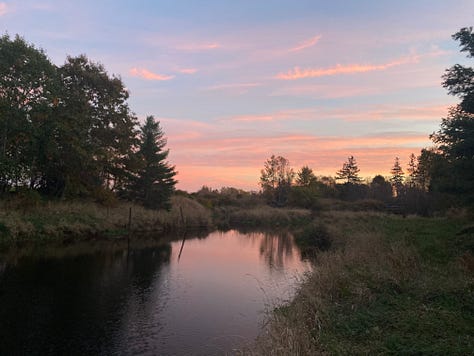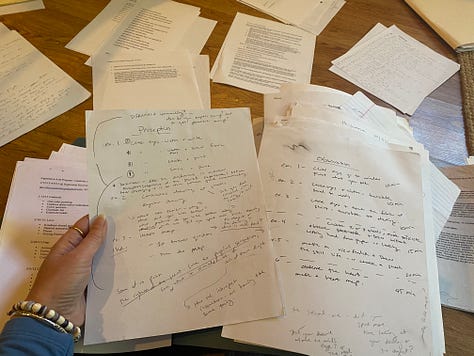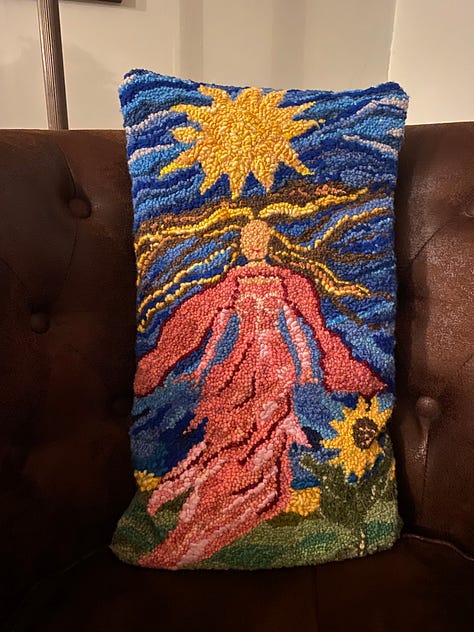Finding Necissity






Dear Starlight,
In his essay Economy, Thoreau speaks of knowing what is a necessity unique to you and living with only that. He curtly describes his experiment of living richly and as free as he possibly can by reimagining the popular paradigm of necessity. Thoreau posits that men slave their lives to a foolish illusion of what they think they need, which is too much. He watches them labor under falsehood for an out-of-reach feeling of enoughness.
His essay is a conversation on values and delusion.
He adamantly encourages one to not "do good" but rather "be good."
I am left thinking about the word "Earn." It comes from Earnest, which means that we earn our wages based on a pledge—a serious promise to do something. When there are no wages attached to our work, what do we earn and who is our promise to?
What do we want to earn or to have? Who do we want to promise our work to?
What if we already are what we want to have?
Meaning, how has our language of nouns divorced us from the reality of verbs.
Good is enough. Necessity is enough.
Enough means to bring together what is reached for.
Good means God.
Necessity means what is essential at the moment, what is needed to connect one action to the other.
Love.
Reflecting on Thoreau's call to know what is uniquely necessary, I think about how words like 'earn' and 'good' shape our lives. They subtly influence what we strive for yet often push us toward illusions of worth. What if, instead, 'good' means being in harmony with oneself, and 'necessity' is what we need for that harmony? What if that is how God works, God as ever-moving change? As love.
—--
Simone Weil in her chapter, Illusions, in Gravity and Grace, says,
We are drawn toward a thing because we believe it is good. We end by being chained to it because it has become necessary….
We only possess shadowy imitations of good. It is also in relation to good that we are chained down like captives. We accept false values which appear to us, and when we think we are acting, we are reality motionless, for we are still confined in the same system of values…
Her essay explores unreality in such concepts as time and imagination. She weaves back and forth between seeking truth of reality versus illusion and that ascribing value to perception of things creates an illusion that ties us to a way of being. In some ways, she talks about the problem of naming what we perceive falsely and then living by that illusion.
There is always a relationship with time to be taken into account. We must get rid of the illusion of possessing time. We must become incarnate. Man has to perform an act of incarnation, for he is disembodied by his imagination. What comes to us from Satan is our imagination.
This paragraph illustrates many things to me: the problem of trusting our minds over our bodies, the problematic thinking that we can possess (own) anything, and the ensnarement of living out of alignment with true necessity but instead with what we wrongly believe is necessary to live.
She says that "what is real in perception and distinguishes it from dreams is not sensations, but the necessity enshrined in those sensations." God.
Her essay is about being in relationship with God, but not illusory good.
—-
Ahead of my trip, I pulled a Tarot card in the position of "Advice." It was the Devil. Looking at the Devil card in the Ryder Whyte Tarot deck, I see the illustration of the chains of false love, false values, or what is otherwise called delusion.
Listening to Milton's poem Paradise Lost, translated by Milton scholar Michael Ursell, I learned a new story about the devil, or rather Satan, the fallen angel. The poem starts out with Satan sitting in a pond of fire, lamenting a time when things were good between him and God.
I learned that what provoked the devil to betray God was his disbelief that there was enough love for him and the son of God, too. His fear of unworthiness and his jealousy prompted him to organize an angel revolt in heaven against God, and God laid down his boundaries and sent him out of the kingdom cuz you can't have a peaceful kingdom with a deceitful dude. So, Satan, one of God's beautiful and beloved angels, fell to earth, and then, in spite, he tempted Eve with knowledge, which he knew would cause her pain, which in turn would cause God pain.
This story of Satan reveals how his false belief led him astray; a belief rooted in fear and scarcity, he suffered forever.
Thoreau and Weil both urge us to examine what we consider necessary, warning against illusions that bind us in suffering. In a similar vein, the devil story got me thinking about the false beliefs that tell us we are not good enough or loved enough unless we do X, Y, and Z, and so we lock ourselves into patterns of harm.
But what if we are good enough already?
We don't have to do good; we just need to be good by being who we already are.
You do not have to be good.
You do not have to walk on your knees
for a hundred miles through the desert, repenting.
You only have to let the soft animal of your body
love what it loves—Mary Oliver
—-
David Whyte writes:
We name mostly in order to control, but what is worth loving does not want to be held within the bounds of too narrow a calling. In many ways, love has already named us before we can even begin to speak back to it, before we can utter the right words or understand what has happened to us or is continuing to happen to us: an invitation to the most difficult art of all, to love without naming at all.
…
We live in a time of the dissected soul, the immediate disclosure: our thoughts, imaginings and longings exposed to the light too much, too early and too often; our best qualities squeeze too soon into a world already awash with ideas that oppress our sense of self and our sense of others. What is real is almost always, to begin with, hidden and does not want to be understood by the part of our mind that mistakenly thinks it knows what's happening. What is precious inside us does not care to be known by the mind in ways that diminish its presence.
…
Simone Weil writes:
God and the supernatural are hidden and formless in the universe. It is well that they should be hidden and nameless in the soul. Otherwise, there would be a risk of having something imaginary under the name of God.
…
This week has been what I had hoped for without having words for all that it could be.
To travel in all directions at once.
To lose track of what day it is.
Which only matters to some people.
—
Do you want to grow your capacity?
Go somewhere unknown.
Drive through endless woods.
Drive over a bridge with no end in sight,
With no guardrails.
Walk alone. Walk alone. Walk alone.
You can follow one light
Through the turbulence.
—
To go far away.
Do something from long ago, again, but different.
To find yourself.
Sit in a small room.
On an island.
—
Drive a harrowing drive.
Cross a bridge.
Drive through the nightmare.
—
Stay.
Or go.
—
I turned around.
I found a pond.
Named The Lord's Pond.
I found myself.
Again, but different.
Back over the bridge.
On an island, again, but different.
I found myself, again, but different.
Both places felt like care.
—-
I rewrote my name.
What I am.
It felt good.
For a minute.
To be seen.
But then it turned around.
It locked me down.
So I erased the words and ran away.
—-
Come find me now
Other things I found on my adventure:
A new friend
Crystal rocks
A star pillow
Courage
Discipline
Delicious seaweed salad
Devotion



